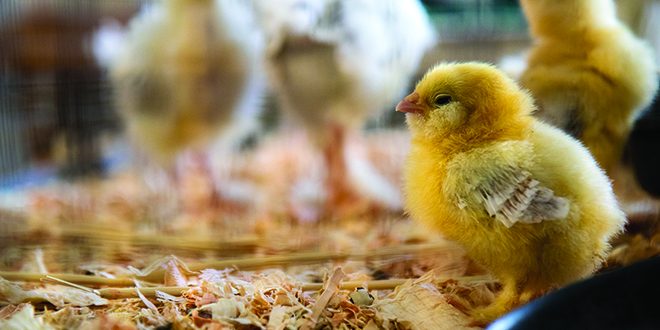EMERGING research suggests that ‘listening’ to the sounds newly hatched chicks make can aid early detection of welfare issues. In nature, when distressed and uncomfortable with their surroundings, chicks attract their mother with a loud and distinct stress call. In commercial chicken farming however, thousands of chicks are reared in batches.
In a study published by the Royal Society, a team of animal welfare and behaviour scientists from across the UK collected acoustic recordings in 12 typical flocks of 25,000 chicks. They found that these calls could be identified above other noises such as farm machinery and regular calling. Where previous research had linked distress calling to stress and anxiety-like states in chicks, this study shows it could predict flock-level behaviour, future growth and mortality rate.
Professor in animal behaviour informatics at Newcastle University and principal investigator Lucy Asher said, “By analysing the calls chicks make in their first few days of life, it seems we are able to predict weight gained and the number of deaths in the whole flock for the whole life. This means we could have a very powerful tool to help chicken welfare. What is particularly useful is that this welfare indicator can be used early on in life, whereas most chicken welfare indicators are taken later in their life, when it is too late to make major improvements. As an added benefit this study shows how we can measure chick calls automatically, meaning no extra work for farmers, but more information to help them improve chicken welfare.”
The researchers employed a method that involved the ‘spectral entropy’ of the soundscape – a value that describes how sound can vary from a clear, tonal note up to white noise. As increasing numbers of chicks call in unison, the usual background noise of the farm becomes overall more tonal. This ‘computationally simple’ way of counting distress calls could signify to farmers that chicks require their attention and may ultimately improve welfare across the lifetime of the chick.
Reader in animal behaviour at the University of Roehampton Dr Alan McElligott said: “The results of this research show how useful vocalisations can be for monitoring welfare, and especially in an age when animal welfare needs should be central to progress in precision livestock farming.”
The study involved researchers from the University of Plymouth, University of Roehampton, SRUC, and Newcastle University. Findings are published in the Journal of the Royal Society Interface.

